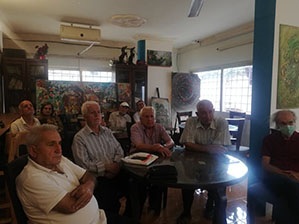The Syrian Historical and Scientific Society held a cultural lecture entitled: (People’s Heritage inJableh), which was delivered by lawyer Professor Taha Al-Zouzo at the Society’s headquarters in Jableh.
The lawyer began his lecture by presenting a historical overview of Jableh city, which was affiliated with Ugarit Kingdom in the fifteenth century BC, noting that the name of Jableh city had not changed except slightly since four thousand years ago, and its name (Jabaala) was mentioned in the Ugaritic cuneiform writings and then the name was distorted In classical times, it was referred to as (Gabala).
The ancient Egyptians called it (Korna) and the Byzantines called it (Zebel) until it was liberated and its name settled on Jableh after the Islamic conquest. The lecturer also reviewed traditional folk songs in Jableh, which was a reflection of the social and economic situation.
Regarding the popular games that the children used to play, the lecturer mentioned that they used to carry a game of cloth with which they roamed the neighborhoods during rainy days.
The lecturer also stopped at a number of traditional folk tales and epics that men used to circulate during their sessions in cafes. Among the most prominent aspects of heritage in the city of Jableh, which the lecturer also talked about, is what is known as (Karkoz and Aywaz), which was held in one of Jableh’s cafes. Lawyer Zouzo also addressed in his lecture the tourism of Sultan Ibrahim bin Adham, who believed in asceticism in his life, leaving his kingdom to roam the corners of the earth to the city of Jableh in which he resided, and his story turns after his death into an influential and vivid popular tale.
In his lecture, the researcher referred to the diverse folklore represented in the folk songs that people used to chant on occasions on holidays, national occasions and weddings, all of which constitute a rich cultural heritage of the civilization and history of Jableh.
Lama Rzzok

